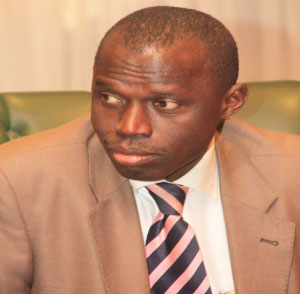
“Tradeis a key componentto sustainable development,but the current level of Gambian exportsat about D4 billion for 2013 out of a provisional total tradevalue of about D16 billion, is very low and this must changeif we are tocreate more wealthand employment ,” the minister of Trade, Industry, Regional Integration and Employment (MOTIE), Abdou Kolley, said yesterday.
He spoke at the Trade ministry’s conference room, where a National Export Strategy Implementation Committee was inaugurated and put on their toes to support the implementation of the NES, by providing a unifying framework to coordinate and monitor export promotion and export financing activities, as well as ensure successful implementation of the strategy.
“The focus of the NES in promoting export is very central in the crusade to achieve the PAGE objectives of accelerating growth for poverty reduction,” the trade minister told the NES Implementing Committee.“As members of the NES Committee, you are expected to help in ensuring that the activities of the various strategies in the NES are mainstreamed in the programmes and activities of your respective sectors.
“In designing programmes and projects in the sectors identified by the NES, consideration should be taken of NES activities so that they become part of the national efforts to implement the NES such that their outcomes contribute to the promotion of exports. This is all the more important given the limited resources to support national development programmes.”
Minister Kolley said the programmes and projects in the NES priority sectors should therefore help in ensuring effective restructuring of the sectors towards increased productivity and quality assurance for improved market access for Gambian exports.
“Our target should be to ensure that as we implement the NES, we succeed in addressing our challenges and harnessing the opportunities in all the NES priority sectors to respond to increased modernization and large-scale production with high productivity, quality, efficiency and competitiveness,” he stated, adding that the implementation of the export strategy should thus be pursued with vigor and commitment by all stakeholders to achieve the target of not only boosting domestic demand, but also having a presence in export markets.
“We should all set our targets high so that after four years of NES implementation, we are able to lift The Gambia’s exports from its current low level to a level that we can all be proud of,” he said.
In her remarks on the occasion, MOTIE’s permanent secretary Naffie Barry gave a background of NES, saying the Gambia Investment and Export Promotion Agency (GIEPA) and MOTIE, in collaboration with other national stakeholders, completed the development of a National Export Strategy (NES) for The Gambia through some financial support from the Commonwealth Secretariat.
“The NES Drafting Team carried out robust consultative arrangements with both public and private sector stakeholders during the strategy formulation processes,” she said. “Following its validation, the NES was launched on behalf of His Excellency President Jammeh, by the Minister of Finance and Economic Affairs on 19 March 2013.
The development of the NES, PS Naffie Barrie reiterated, is intended to wean the country from being a Net Importing to a Net Exporting nation.
The strategy is to be implemented over a five-year period between 2013 and 2017, she said, adding that the successful implementation of the NES requires the involvement of all relevant stakeholders.
“It is therefore, imperative to set up a competent coordinating body with legitimate authority to promote and sustain effective processes that links the implementing agents and provides due public awareness on the NES.”
She also said the Terms of Reference guiding the work of the NES committee highlight critical issues covering its creation, functions, membership composition and organization structure, secretariat, coordination of general meetings, agenda, deliberations, voting and financing.
The National Steering Committee is to be supported by 12 Sector Working Groups detailed in the Draft Terms of Reference.
According to the CEO of GIEPA, Fatou Mbenga Jallow, the trade sector in The Gambia is dominated by imports with exports accounting for slightly below 40% of total trade.
“Exports is dominated by re-exports and our country is highly dependent on the re-exports and tourism sectors for its foreign exchange earnings,” she noted, adding that over the years, the country’s trade performance has been “inconsistent” with evidence of fluctuations in total trade, imports, and re-exports.
“Whilst total trade has increased over the years, exports have tended to be more erratic over the same period with intermittent periods of increase and decrease,” she notes.
“Though exports, especially re-exports, have benefited from the country’s competitiveness in port clearance costs and efficiency in terms of turnaround time, this advantage was overtime eroded by tariff harmonization policies of ECOWAS and improvement in efficiency in other competing Ports within the sub-region.”
Mrs Jallow said conscious efforts had been undertaken to develop the National Export Strategy to help reverse the trend in the country’s trade position and improve the merchandise Trade Balance, Balance of Payments, and Terms of Trade.
“It is therefore envisaged that through this strategy, the structure of output and therefore the contributions to GDP by the NES target sectors would help improve and diversify the country’s export base and in the process realize some degree of industrialization,” she added.
Momodou A. Ceesay, managing director of Gambia Horticultural Enterprises, a private sector representative at the inauguration ceremony, who gave the vote of thanks, said that giving high priority to exportation would help Gambian exporters to add value to their produce, help the productive sector, create employment, generate more foreign exchange, solve marketing headaches of manufacturers and producers and turn around the country’s economic growth and development for the better.
“The only way we can develop our economy is through export; so let’s give exportation high priority,” Mr Ceesay said.
In wrapping-up remarks, MOTIE’s Trade Director Abdoulie Jammeh outlined the way forward in the coordination mechanisms of NES.


